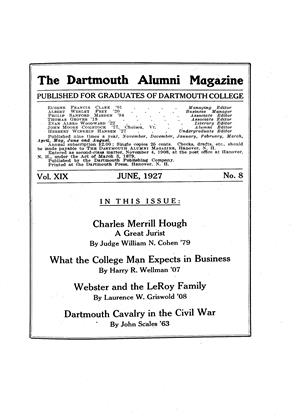One of the best beloved and highly esteemed and most distinguished members of the class of 1879 died on April 22nd last at his home in New York City.
On the professional and judicial career of Charles Merrill Hough many eulogies have appeared in the press of the country and doubtless there will be more to follow from his associates on the Federal bench and from the Bar of the Second Judicial District, but it is most fitting that in this publication a more personal tribute should be found.
In the Spring of 1875 there drove over from Meriden to pass the ordeal of entrance examinations, Bowers, Cohen, Libby, Upton and Hough. Tall, robust, fair-haired, with glasses on a nose (ill fitted to carry them, from which they frequently fell), .Charlie Hough, "Mega," swung into town with the breeziness of a lad a large part of whose life had been spent in army circles and in the West. His leaning was toward the United States Military Academy and a soldier's life. He lamented that his defective vision foreclosed him from such a career, but since that was an obstacle not to be overcome he worked hard and seriously and entered Dartmouth thoroughly prepared.
He was an excellent scholar and stood well in all the studies then prescribed in the course. He learned easily and therefore found time for general reading, and as he read rapidly, he covered a great deal of ground; and not only absorbed what he read' but garnered from his reading much information that he always had at his command. Often, (as his home was far away) he remained at Hanover during the winter vacation spending days in the library and prowling through the books after having plowed through the snow in his rubber boots.
He was well liked by all of us and with good reason. A fine physique, genuine honesty, outspoken and clean-minded, everybody was drawn towards him. To his intimates he was especially near and dear. Among those must be counted his roommates: Closson and myself who, with Bailey, made up the Saturday night duplicate whist quartette. It was rare that any Saturday night during the term the game was not in full blast far into the night.
He graduated from college with honors and used laughingly to refer to the writer as the inevitable winner of the improvement prize because he began so low that all others were mercilessly handicapped in the race. From his living so largely in army circles he developed a commanding and brusque manner which was merely superficial. It was a sort of protective covering for unusual gentleness, tenderness and sympathy.
On leaving college he taught for a school year at Plymouth, New Hampshire, where he formed a friendship that lasted through his life with the Balch family. After that he went to the home of his ancestors in Philadelphia where he began the study of law and where he practiced for many years, until his firm established a branch in New York when he became a resident of that city. There, rather late in life, he married Ethel Powers, and a more congenial and happy alliance it has not been my lot to know. Of the marriage there were born two children, Nancy and John, of both of whom he had every reason to be and was justly proud.
Of his old classmates he continued on intimate terms with Closson, Melville, Proctor, Wheatley and the writer. Rare indeed was the friendship and intimacy between them and it was a cruel fate that ended it after fifty or more years.
His love of Dartmouth was an obsession. He venerated Doctor Tucker and was an ardent admirer of Professors Noyes, Sanborn, Proctor, Lord and President Hopkins. He was a loyal member of the Alpha Delta Phi fraternity. He spent his summer vacations near the old campus and in places reminiscent of his college life, and he was eager and ready always and in all ways to make real sacrifices for our Alma Mater.
In the hearts of his classmates he will be ever loved and cherished and therefore never die as long as one survivor remains.
Judge Hough
 View Full Issue
View Full Issue
More From This Issue
-
 Article
ArticleTHE UNDERGRADUATE CHAIR
June 1927 -
 Article
ArticleWHAT THE COLLEGE MAN EXPECTS IN BUSINESS
June 1927 By Harry R. Wellman '07 -
 Article
ArticleATHLETIC COUNCIL REPLIES TO PRESIDENT HOPKINS
June 1927 -
 Article
ArticleSECRETARIES ASSOCIATION MEETS IN HANOVER
June 1927 -
 Article
ArticleDARTMOUTH CAVALRY IN THE CIVIL WAR
June 1927 By John Scales '63 -
 Article
ArticleCAN CHINA SURVIVE
June 1927








